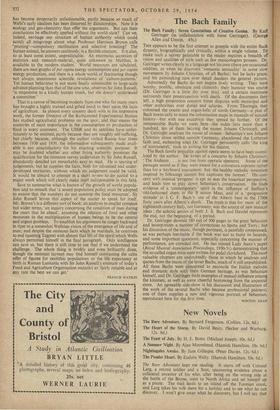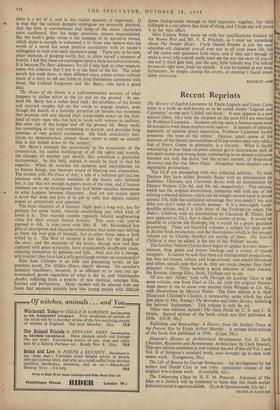New Novels
The Rare Adventure. By Bernard Fergusson. (Collins. 12s. 6d.) The Feast of July. By H. E. Bates. (Michael Joseph. 10s. 6d.)
The Rare Adventure kept me reading. It starts off with Colonel Larg, a retired soldier and a Scot, uncovering evidence about a collateral ancestor of his who, after being on the wrong side at the battle of the Boyne, went to North Africa and set himself up as a pirate. The trail leads to an island off the Tunisian coast, and Larg tikes his wife there for a holiday and to see what he can discover. I won't give away what he discovers, but I will say that
there is a lot' of it, and in this matter quantity is important. It
• ray is true that the various dangers undergone are primarily physical, that the hero is conventional and some of the minor characters mere cardboard, that the larger emotions remain uncommitted. But the book's great virtue is the tautness of its narrative thread, which alone is enough to commend it to those who believe that the worth of a novel has some positive correlation with its reader's willingness to turn over each successive page. There are, to be sure, other methods of gauging worth, but, to allow myself a moment of homily, I feel that these are contingent upon a basic narrative criterion. It is because The Rare Adventure, for all it may lack in other respects, meets this criterion that I put it at the head of the list. The other novels this week show, in their different ways, where writers without much of a story to tell are liable to land themselves compared with those, like Colonel Fergusson and Mr. Beaty, who have a good deal.
The Heart of the Storm is a well-constructed account of what happens to airline pilots in the air and on the ground. At sea- level Mr. Beaty has a rather dead stick: the problems of his lovers and married couples fail on the whole to engage interest, even though the sketch of a horridly attractive air hostess has moments that promise well and should start sympathetic sweat on the fore- head of every man who has had to work with women in uniform. But once out of the hangar and off the ground Mr. Beaty really has something to say and something to narrate, and provides long stretches of very painful excitement. His book abundantly rein- forces my determination, already fierce, never to enter an aircraft that is not bolted doWn to the tarmac: Mr. Bates's strength lies notoriously in his• evocations of the countryside, his careful building-up of all the sights and sounds, the changes of weather and season, that constitute a particular environment. In this field, indeed, it would be hard to find his superior. When he switches his cameras and microphones on to human beings, one becomes aware of blurring and attenuation. The trouble with The Feast of July, a tale of a betrayed girl and her relations with the various members of the family who befriend her, is just that not enough happens most of the time, and if human relations are to be investigated they had better manifest themselves in what happens between characters. And yet one cannot reject a novel that does one part of its job so well, that depicts country scenes so attractively and precisely.
The basic situation of A Summer Night goes a long way, too far perhaps for some tastes, towards establishing just what kind of novel it is. Two married couples regularly inhabit neighbouring villas for their annual Italian holiday. This year—yes, you've guessed it—Mr. A runs away with Mrs. B. Mr. Moorehead has gifts of description and character-observation that come near defying at times the iron grip of formula, but at other times seem a little wilted by it. The flow of incident is too slack for the length of the story, and the emotions of the lovers, though. now and then captured with great sympathy, have consequently insufficient cause, reducing themselves to gestures and talk. And, just for a change, why couldn't they have had a jolly good laugh or beer-up occasionally?
Miss Jane Gillespie is an able and promising writer, as her previous novel, The Hidden Heart, clearly showed. No novelist's technical machinery, however, is so efficient as to turn out up- to-standard goods regardless of what is fed in, and Nightingales Awake, suffering from a paucity of raw material, emerges thin, hurried and perfunctory. Many readers will be pleased with any book that recounts amiably how two young people with difficult
home backgrounds manage to find happiness together, but Miss Gillespie is a cut above that kind of thing, and I hope she will prove it in her next effort.
Miss Eudora Welty turns up with her qualifications franked by the Boston Post and Mr. V. S. Pritchett, so I must say something about The Ponder Heart. Uncle Daniel Ponder is just the most adorable old character you-all ever saw in all your sweet life, full of the cutest and quaintest little ways, and if that ain't enough to make a novel, why you-all really must see the way the story (if you-all can call it that) gets told, just the cosy little friendly way I'm talking to you-all right now, hush thy mouth. It can be hushed at any time, fortunately, by simply closing the covers, an exercise I found irresi- stibly attractive.
or
KINGSLEY AMTS



































 Previous page
Previous page